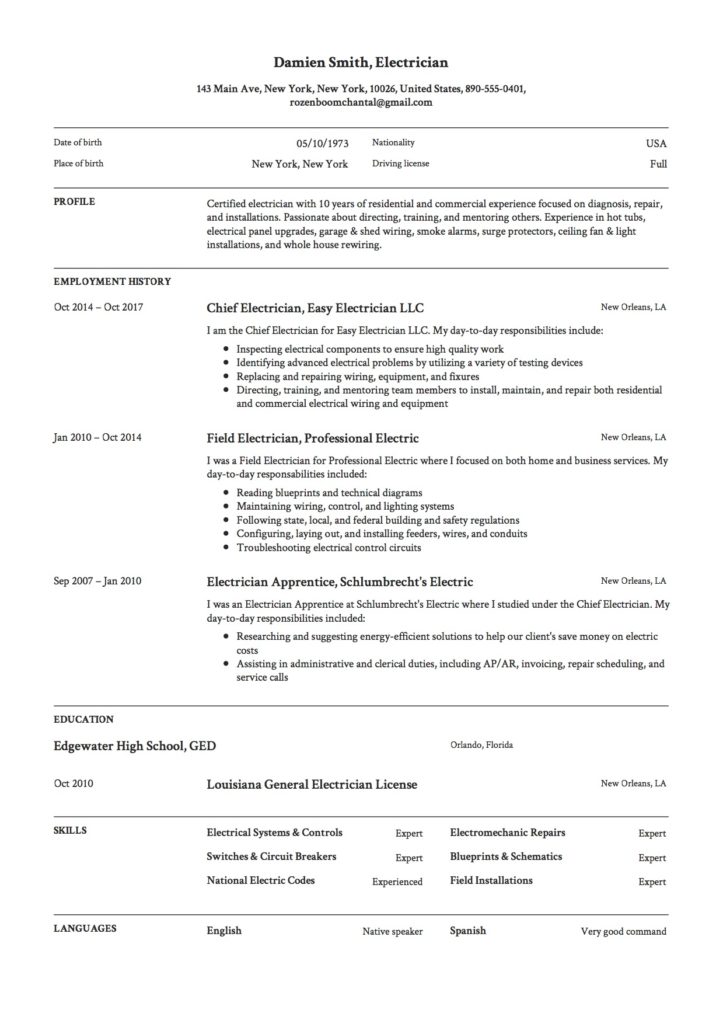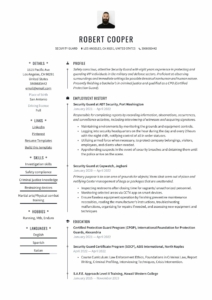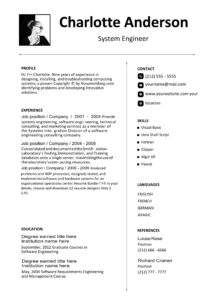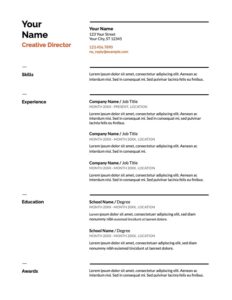When you are seeking a new electrician position, it is important to start looking at proven professional electrician resume examples.
With hundreds of other electricians looking for a new position daily, you need to make sure your resume stands out by being both informative and intriguing. Here we explain to you how you make your resume stand out, and impressive, and look up-to-date to today's standards. Let's get started!
What you can read in this article
Electrician Resume Examples
Or download these examples in PDF at the bottom of this page for free
Highlights in Your Resume
Depending on how far along you are in your career, you are going to want to highlight different things.
For both beginners and advanced electricians, what is most important is to identify if you have done residential work, commercial work, or both. This information should be included in both your summary/objective and in each position description.
The next thing to focus on is the type of installation, repair, and maintenance services you are familiar with. Some common services include hot tubs, whole house rewiring, security lighting, garage & shed wiring, swimming pool circuits, arc fault breakers, outlets & switches, and surge protectors. Many companies specialize in any of these areas, so the more of a niche you can put yourself in, the better.
For beginner electricians, focus on the actual projects, tools, equipment, and methodologies that you have experience with. Also, if you were mentored by a Chief Electrician, or had an apprenticeship, make sure to point that out in your position description.
For advanced/journeyman/master electricians, employers aren’t looking for the tools and methodologies you have experience with, as it is assumed that you know the basics. Instead, focus on any area of specialty that you have in terms of services or projects.
In addition, as you get farther along in your career, employers are for you to be able to read, and sometimes draw, blueprints and technical schematics, so make sure to include that skill. Lastly, advanced electricians should have experience leading and mentoring others.
Your resume should also be tailored to the position and company you want to work for. For example, if you are applying for a position at an electrical company that focuses on swimming pool circuits, use the cover letter to tell a story of a project that you successfully completed in that realm.
Resume Sections
Contact Information
Name, Address, Email, Telephone, Nationality, Driver's license (optional)
Profile
1 – 3 sentences giving a broad overview of your profession, years of experience, and specific areas of specialty
Skills Summary/Key Skills
List key skills that you possess, that is also found in the job posting
Languages
Optional- If you know how to speak multiple languages, include what languages you know and your level of proficiency. This is especially important when looking for work in a cosmopolitan city.
Employment History
Showcase your past places of employment and include a list of your daily responsibilities. If you are new to the electrical field, you can add other employment (ex. Server, Customer Service Agent, etc.) to show you have work experience. If you have been in the industry for a while, only include your electrician experience.
Education/Licenses/Certifications/Relevant Coursework/Training
List any professional development, licenses, certifications, workshops, or training that you have received. Most employers don’t require their electricians to have more than a high school diploma. Keep in mind that most states require you to have an electrician license, so be sure to include that here.
 Electrician Job Description & Responsibility
Electrician Job Description & Responsibility
Whether you are just starting your electrician career, or are a seasoned Master electrician, employers are expecting you to be familiar with the basics and what matches your experience and certifications. To make sure your resume is what employers are looking for, try incorporating these things:
Examples
General and Apprentice duties
- Experience in the installation, repair, testing and maintenance of electrical systems, wiring, tools, appliances, and fixtures
- Maintaining, repairing and installing wiring, controls, and lighting systems
- Inspecting electrical components and troubleshooting them for repair
- Following federal, state, and local building regulations
- Documenting installations, maintenance, and repairs
- Preparing job sites for installation
- Maintaining personal toolsets
- Documenting installations, maintenance, and repairs
- Assisting in installing fire and security alarm systems, thoroughly tested the functionalities
- Measuring, cutting and bending of a conduit, both manuals and mechanical
- Following the National Electrical Code (NEC) carefully
Journeyman electrician duties
- Install circuit breakers, transformers, stabilizers, generators and distribution systems.
- Diagnose and replace high voltage electrical power lines, pole wiring, and underground lines
- Inspecting electrical components and troubleshooting them for repair
- Install, maintain, plan, layout, supervise, and construct electrical systems
- Testing a variety of electrical systems using specialized testing equipment
- Specializing in the repair of hot tubs, swimming pool circuits, attic fans, and surge protectors
- Reading and drawing blueprints, technical diagrams, and schematics
- Working and maintaining of panel boards and wiring, ensuring functionality for all units
- Carrying out of light administrative work when necessary, including but not limited to phone reception, client relations, and project reporting
- Assisting in seeking, interviewing and hiring new employees
Master Electrician duties
- Working independently without supervision (some jurisdictions allow this, while others require you to have a separate contractor license)
- Obtaining permits from government agencies to perform specific work projects
- Hiring electricians to work on your team (some jurisdictions allow this with a master electrician license, others require an independent electrical contractor license)
- Install, maintain, plan, layout, supervise, and construct electrical systems
- Directing, training, and mentoring other electricians to install, maintain, and repair electrical wiring and equipment
- Working with multiple construction designs and executing teams to oversee, develop and install blueprints of electrical wiring for new commercial and residential development projects
- Responsible for interviewing and hiring new employees to maintain operability of the company
Certificates associated with Electricians:
| Cable Splicing Certification | EPA Universal Certification | Journeyman Electrician |
| master Electrician | First Aid | OSHA 10 |
| OSHA 30 |
Electrician Soft Skills
Although technical skills are the most important, electricians need to have soft skills, particularly when it comes to customer service. To show employers that you have the soft skills they are looking for, try to incorporate these into your profile, key skills, and cover letter sections: Electrician essential skills:
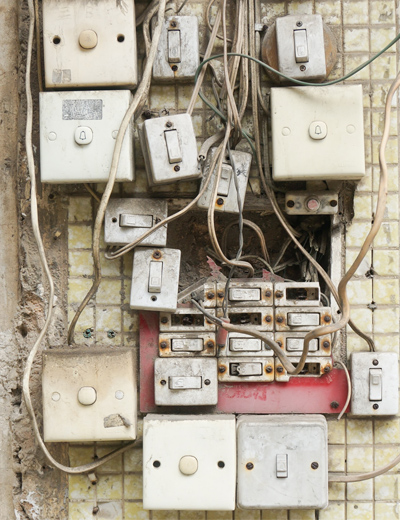
- Critical thinking
- Business savvy
- Physical strength and stamina
- Excellent eyesight
- Customer service
- Analytical
- Decision making
- Problem-solving
- Accuracy
- Time management
- Troubleshooting & Diagnosing
- Written & Verbal Communication
- Teamwork
- Able to Multitask
- Organized
Quantifying Your Resume
Employers love hearing about numbers because it makes your previous experience sound more tangible. When writing your resume, if you can answer the questions, “How much?” or “How many?”, you should try to include that number in your job description. For instance:
- How many homes/businesses did you service a week?
- How much money was a building/construction project worth?
- How many swimming pool circuits have you installed or repaired?
Electrician Action Verbs
| Prepairing | Consulting | Maintaining |
| Repairing | Adhering | Testing |
| Troubleshooting | Installing | Cleaning |
| Documenting | Interpreting | Obtaining |
| Climbing | Estimating | Reading |
| Working | Mastering | Developing |
| Cultivating | Analyzing | Wiring |
| Training | Directing | Communicating |
| Solving | Reading | Applying |
Related Cover Letters
For more information on how to write and download an electrician cover letter.
Download Electrician Resumes in .PDF
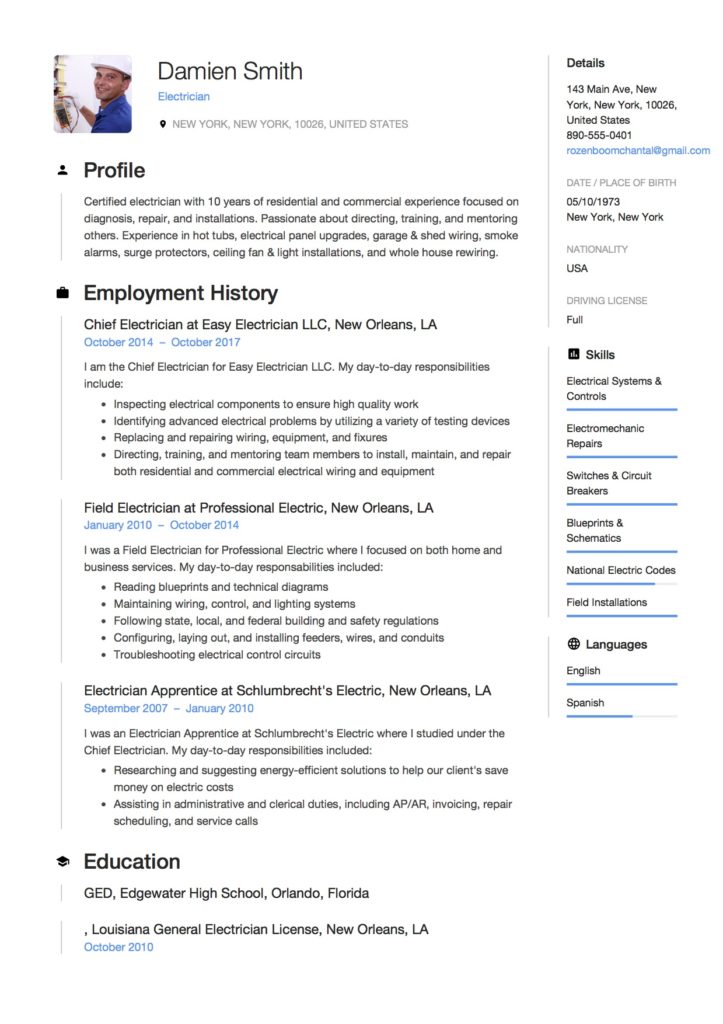
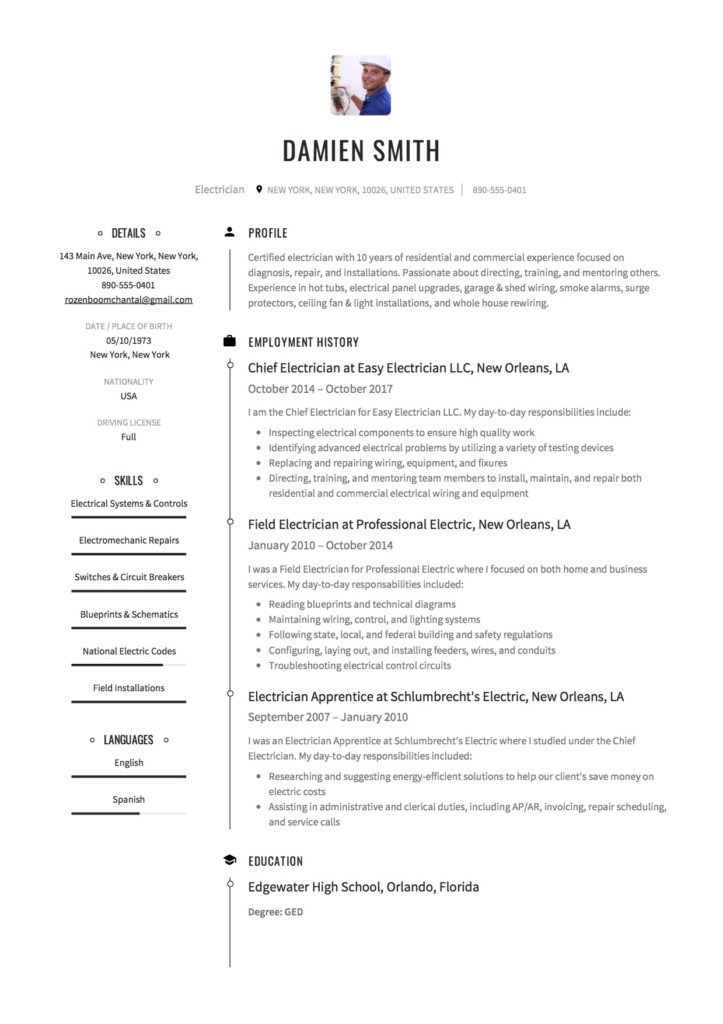
> Electrician Resume 1.PDF | > Electrician Resume 2.PDF
> Electrician Resume 3.PDF | > Electrician Resume 4.PDF

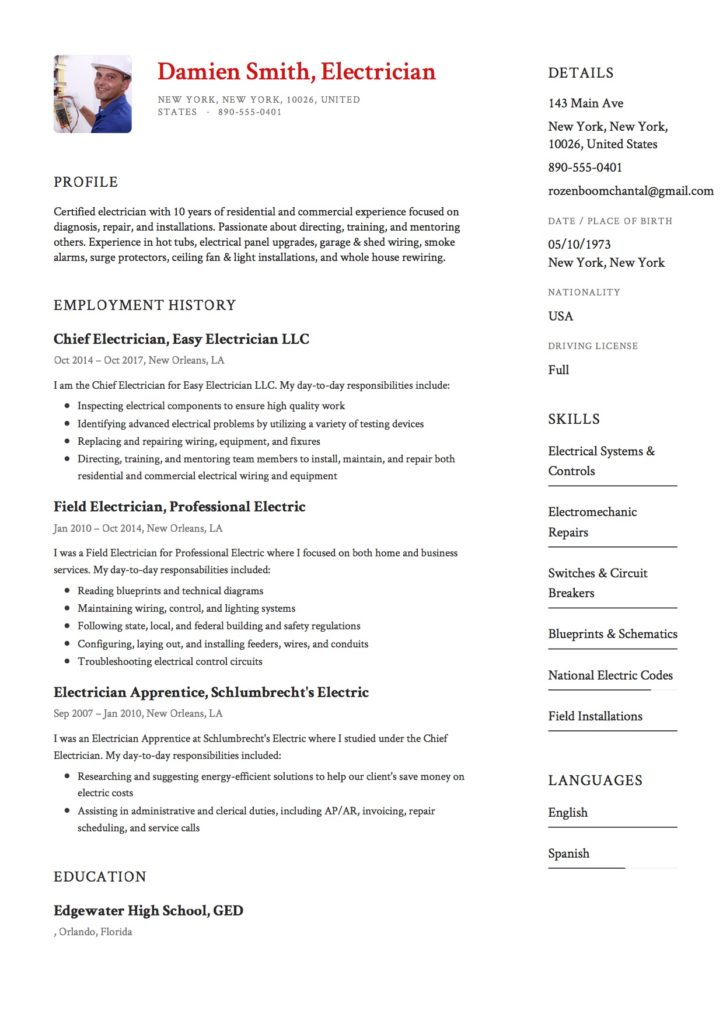
> Electrician Resume 5.PDF | > Electrician Resume 6.PDF
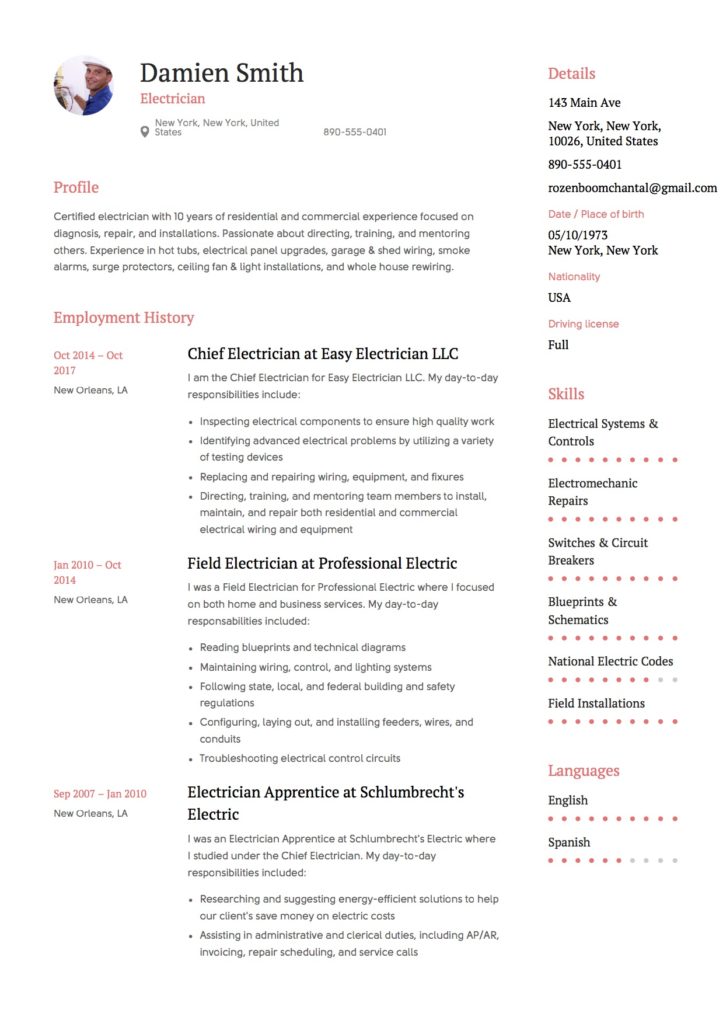

> Electrician Resume 7.PDF | > Electrician Resume 8.PDF
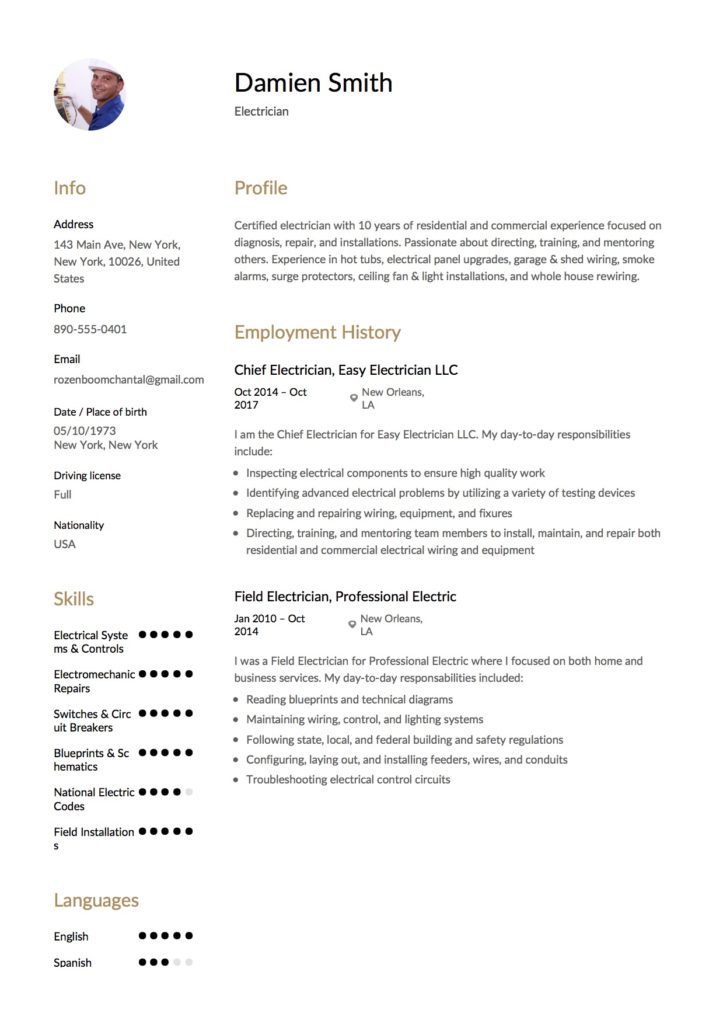
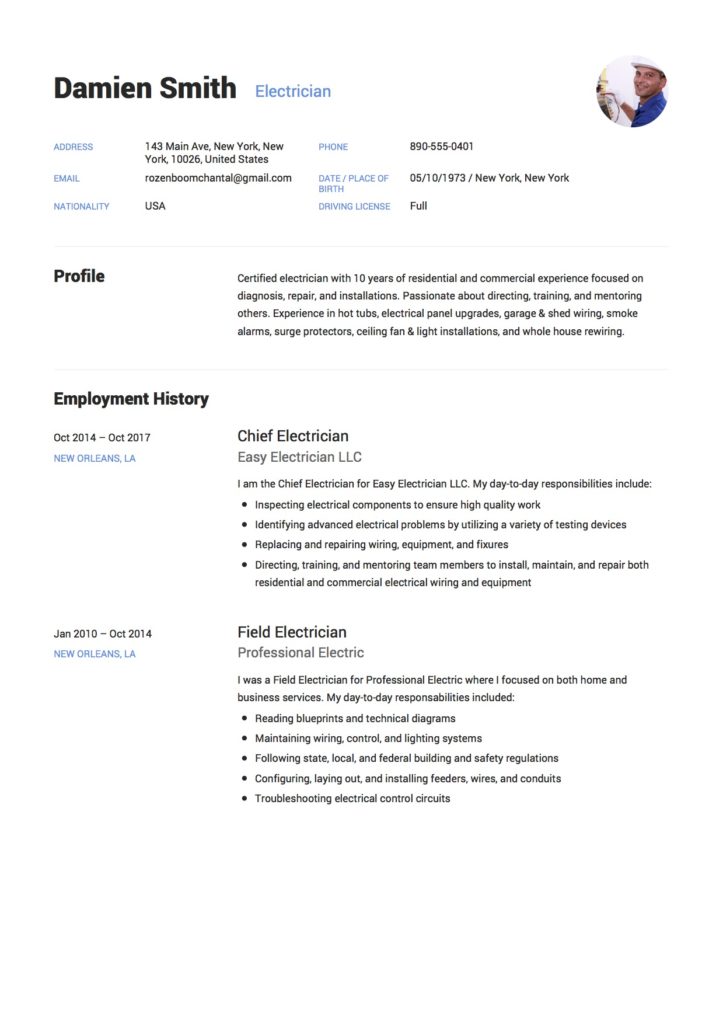
> Electrician Resume 9.PDF | > Electrician Resume 10.PDF
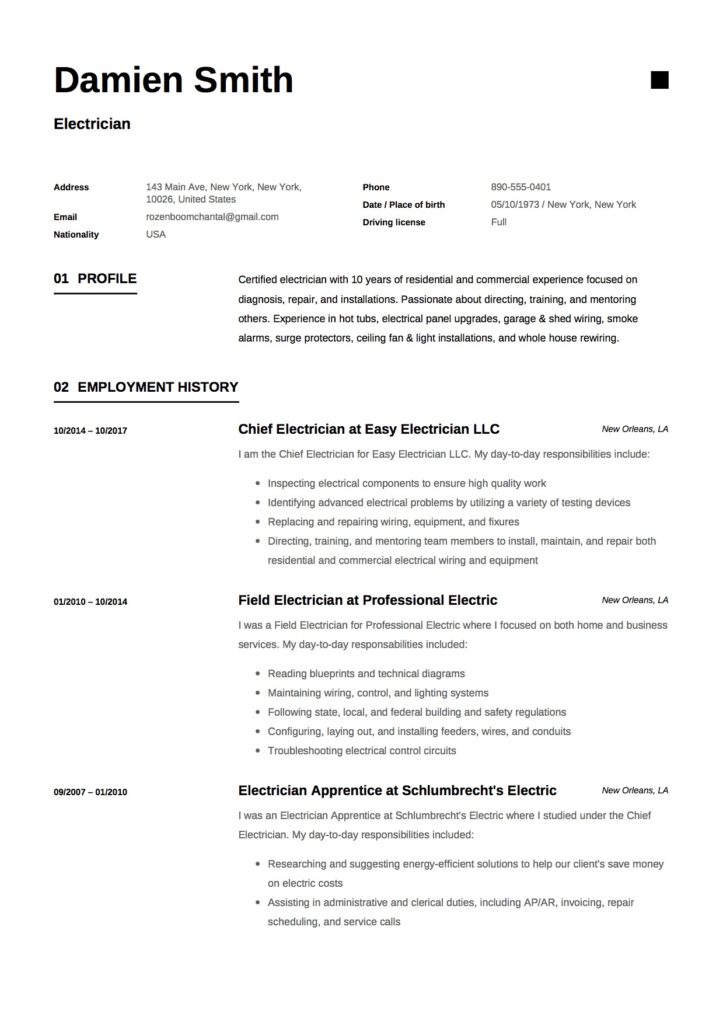
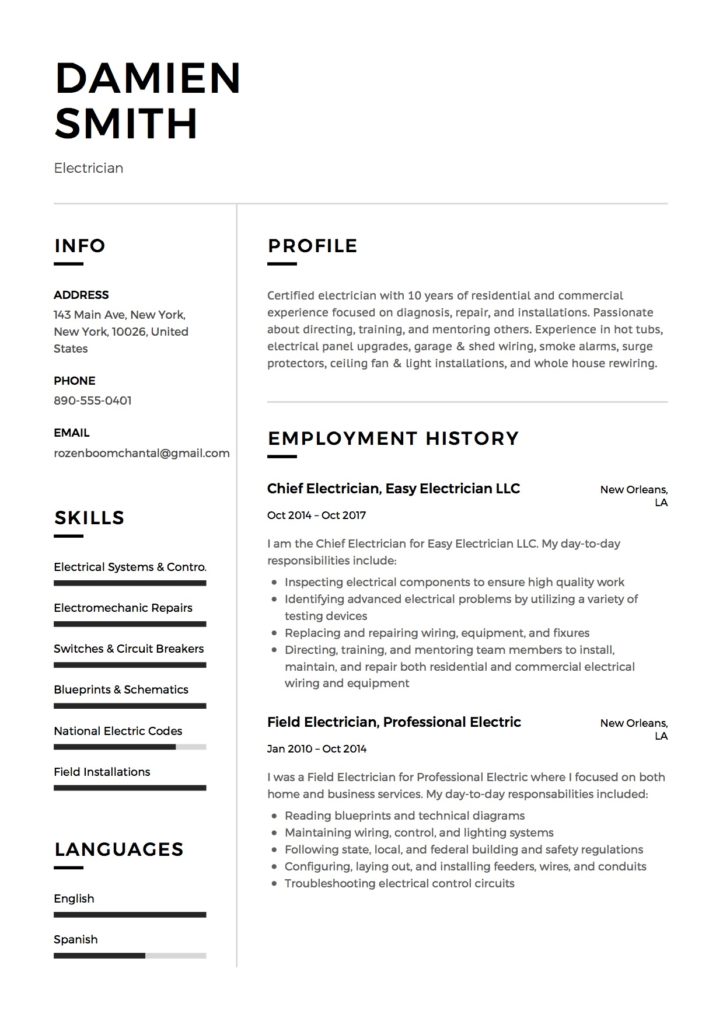
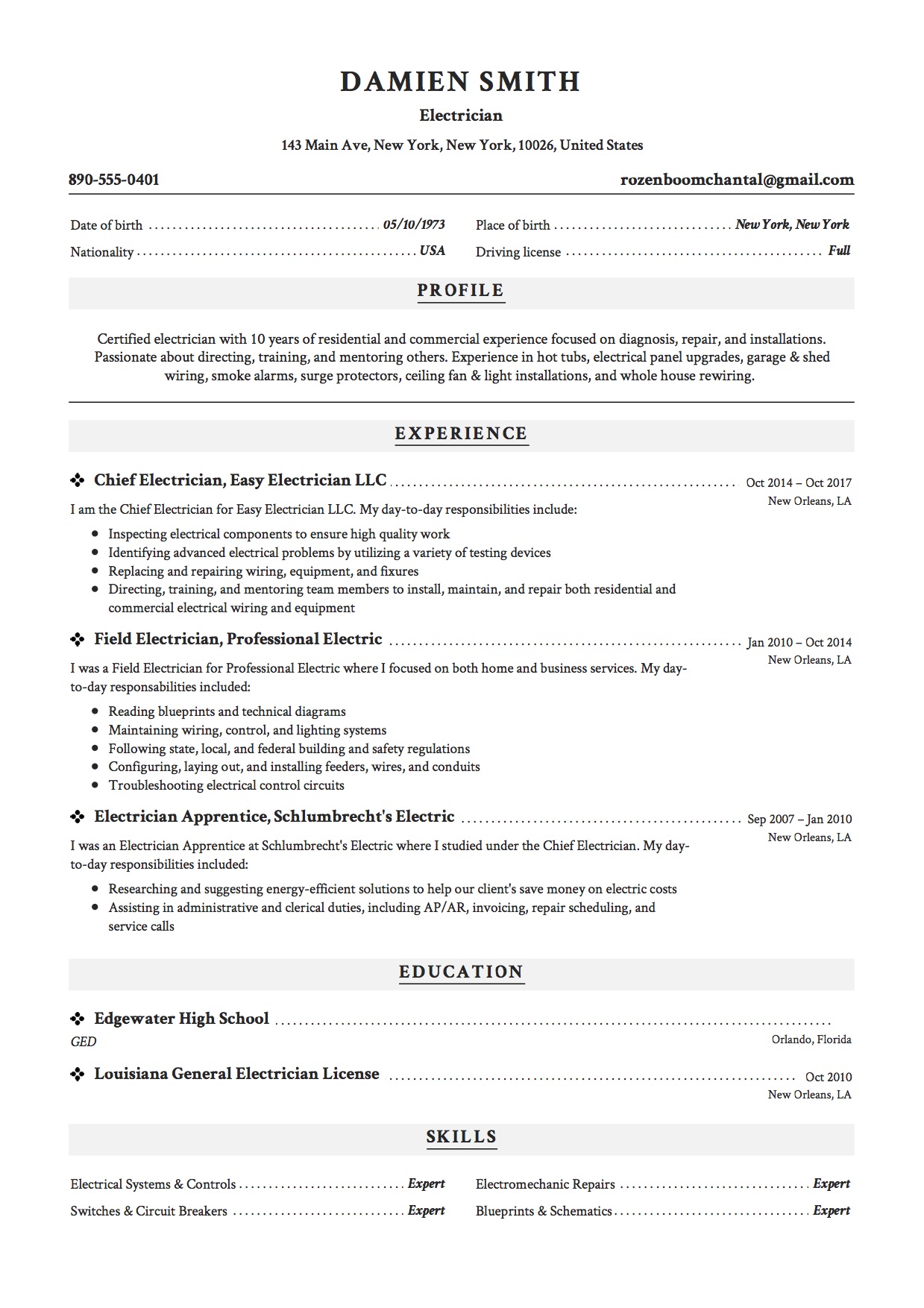
 Electrician Job Description & Responsibility
Electrician Job Description & Responsibility 